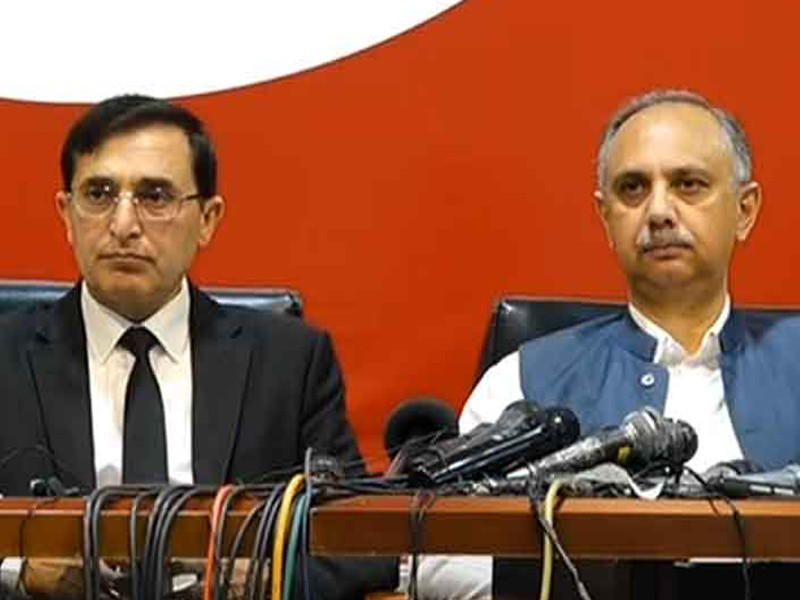
The Pakistan Tehreek-e-Insaf (PTI) has decided that it will become a part of the Judicial Commission of Pakistan (JCP) after the National Assembly speaker initiated the process for the body's formation, it emerged on Monday.
The PTI, whose members are sitting in parliament under the banner of the Sunni Ittehad Council (SIC), has decided to join the JCP just days after it boycotted the voting process on the 26th Constitutional Amendment by terming the procedure adopted for it as flawed.
The Pakistan Muslim League-Nawaz (PML-N) - led ruling alliance, with the support of the Jamiat Ulema-e-Islam (JUI-F), two members of the Balochistan National Party-Mengal (BNP-M) in the Senate and some independent members who were backed by the PTI-SIC in the National Assembly, passed the 26th Constitutional Amendment on October 21 (Monday) morning after it started the process on Sunday afternoon.
An official statement said PTI's parliamentary committee had given the approval for becoming a part of the JCP after the party's political committee decided the same. The decision is significant as the JCP has been empowered in the 26th Constitutional Amendment to not only finalise judges' names for appointment to the higher judiciary but to also form constitutional benches in it.
The decision to join the JCP has come on the heels of PTI's decision to sit in the NA's special committee, which was formed to deliberate and finalise the drafts and proposals given by different political parties regarding the 26th Constitutional Amendment.
Although PTI didn't present a draft or share anything in writing before the committee, its participation had helped it gain a sense of the developments.
Similarly, apart from getting firsthand information, the two opposition members in the commission can play a role in the appointment of judges, their evaluation, and formation of the constitutional benches, among other matters.
Apart from PTI officials, an official of the National Assembly, requesting anonymity, revealed that NA Speaker Sardar Ayaz Sadiq had sought names from the treasury and opposition benches so that the process of the JCP's formation could be concluded.
Previously, the speaker had also sought names for the constitution of a Special Parliamentary Committee, which recently concluded the process of selecting the Chief Justice of Pakistan from amongst the three most senior judges of the Supreme Court. Earlier, the most senior judge used to become the top judge of the country, but the process has recently changed.
The freshly-amended Article 175-A states that a 13-member judicial commission, comprising the chief justice, three most senior judges of the Supreme Court, most senior judge of the constitutional benches, law minister, attorney general for Pakistan, a nominee from the Pakistan Bar Council, two members each from the National Assembly and the Senate, and a woman or non-Muslim from outside parliament will work for the appointment of the judge in the Supreme Court, high court and the federal Shariat Court.
Under Article 175-A, the commission, by the majority of its total membership, shall nominate one person for each vacancy of a judge in the Supreme Court, a high court or the Federal Shariat Court, as the case may be, to the prime minister, who shall forward the same to the president for appointment.
It adds that the commission will also evaluate high court judges' annual performance, adding that if the performance of a judge were found to be inefficient, the commission shall grant him a period for improvement, as it deemed appropriate. If, it adds, upon completion of the period so granted, the performance of such a judge is again found to be unsatisfactory, the commission shall send its report to the Supreme Judicial Council – which hears cases of misconduct against judges.
The 26th Amendment states that the commission may make separate rules for setting up effective standards for performance evaluation. One third of the members can requisition a meeting by sending a written request to the chairperson who shall convene the meeting of the commission not later than 15 days from the receipt of such a requisition.
It adds that if the chairperson fails to convene a meeting within 15 days, the secretary shall convene the meeting within seven days of the expiry of the aforesaid period.
Through an amendment in Article 191-A, it has been decided that there shall be constitutional benches of the Supreme Court, which may comprise equal number of judges from each province. It adds that the most senior judge shall be the presiding judge of the constitutional benches.
These benches will hear original, appellate and advisory jurisdiction of the top court, adding the bench shall not be less than five judges. Under Article 202A, constitutional benches will also be established in high courts which will hear only constitutional matters.


















COMMENTS
Comments are moderated and generally will be posted if they are on-topic and not abusive.
For more information, please see our Comments FAQ